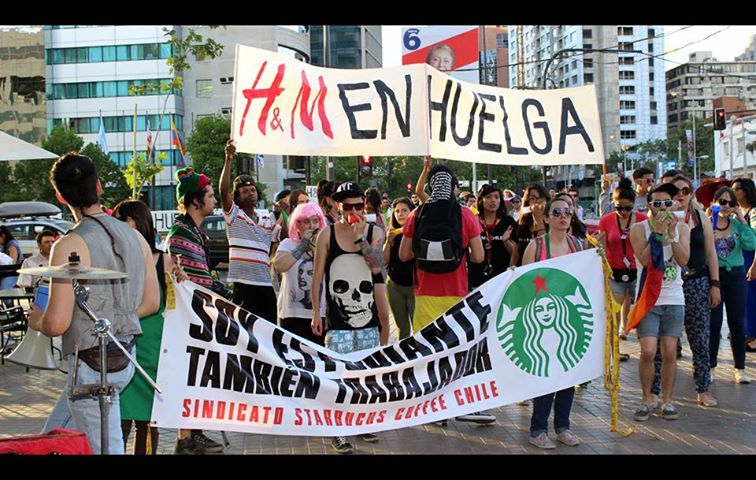Starbucks Union: Chilean Lessons

This is pretty interesting and I didn’t know about it, though I do know that there are unionized Walmarts in Chile:
The Starbucks union was founded in Chile in 2009, at the same time as big student mobilizations. These mobilizations were part of the seed that made it possible to form a union at Starbucks and in an area like fast food, which is very difficult to organize.
The corporate culture of Starbucks is profoundly anti-union. Howard Schultz, who was the CEO of the company [he returned to that role in April —Eds.], is a megalomaniac who cannot bear to see his workers organizing and deciding for themselves what is right.
Starbucks is one of the companies in Chile with the most fines for anti-union practices. All of that was conceived in Seattle, not in Chile. It was devised in the headquarters, where they are devising the tough campaign that you are experiencing now.
In Chile we had to negotiate with a company that did not bargain collectively. They would not move, despite our 30-day strike in 2011—including a 12-day hunger strike by myself and two other leaders. The company offered no raises, no improvements to conditions. It was a very tough battle. We had to fight for years against dismissals by the hundreds.
These companies believe that, by crushing the will to organize, they can continue to apply their business model without any counter-weight. Luckily, the student movement made it possible for us to resist.
If there is one piece of advice I can give, it is that you have to be very persistent.
I started in this 12 years ago, when I was 23 years old and was elected union president. It took us from 2009 to 2015 to get the first passably decent collective contract. We used all different types of strategies—legal strategies, demonstrations, strikes that paralyzed stores, even an international complaint to the OECD [the Organization for Economic Cooperation and Development].
Today I can say that we managed to twist the arm of a colossus. After 12 years, we have a collective bargaining agreement and we are getting raises that exceed 12 to 20 percent of salaries. We have gotten Starbucks—which never closes, at least in Chile—to close on May 1, International Workers’ Day, something we are very proud of.
We now have around 50 percent of the workers in the union, and we hope that this new contract allows us to advance to 75 or 100 percent, and, in three years, that we can be even more powerful in negotiations.
There are different contexts here, largely based on different political realities and different working class cultures, but there’s also a lot we can all learn from Latin America. I mean, I’d bet no one knows that there’s Chilean Walmart unions, and they can’t be easily replicated here, but that doesn’t mean there aren’t things we can learn here.
